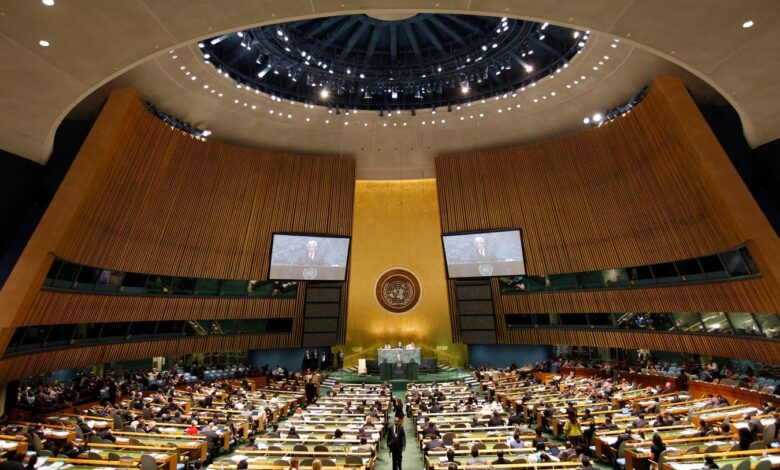U.S. To Restrict Palestinian Delegation Visas Ahead Of UNGA

📝 usncan Note: U.S. To Restrict Palestinian Delegation Visas Ahead Of UNGA
Disclaimer: This content has been prepared based on currently trending topics to increase your awareness.
NEW YORK – SEPTEMBER 25: Palestinian President Mahmoud Abbas addresses the United Nations General Assembly at the UN headquarters on September 25, 2009 in New York City. The United Nations General Assembly is meeting for their 64th session featuring leaders from over 120 countries. (Photo by Michael Nagle/Getty Images)
Getty Images
The State Department said on Friday it will deny and revoke visas for members of the Palestine Liberation Organization (PLO) and the Palestinian Authority (PA) ahead of the United Nations General Assembly, which will take place later in September—a move that appears to contravene the country’s agreement with the organization.
Secretary of State Marco Rubio said the move was part of a broader policy “not to reward terrorism,” arguing that the PLO/PA have failed to meet commitments and have “undermined prospects for peace.” The State Department’s release also cites U.S. law and national security considerations.
According to the statement, the restrictions do not apply to the PA’s Permanent Observer Mission to the UN, which will continue to receive the necessary travel documentation “per the UN Headquarters Agreement.”
The State Department also said Washington could reengage if the PLO/PA take “concrete steps,” including repudiation of terrorism, specifically the Oct. 7 attacks, and an end to what the statement called “international lawfare” through legal bodies such as the International Criminal Court and International Court of Justice.
The announcement comes in stark contrast with the 1947 UN Headquarters Agreement between the United States and the United Nations, which requires the host country to facilitate entry for persons invited to UN Headquarters on official business—regardless of bilateral relations—and to issue required visas promptly.
UN spokesperson Stephane Dujarric said of the move, “We’ll discuss these matters with the State Department, in line with the UN Headquarters agreement between the UN and the US.”
It is unclear if the announcement applies to Mahmoud Abbas, the president of the Palestinian Authority, who was planning to attend this year’s high-level debate, according to Riyad Mansour, the Permanent Observer of Palestine at the UN. Mansour said shortly after the announcement: “We will see exactly what it means and how it applies to any of our delegation, and we will respond accordingly.”
While the U.S. has, at times, used narrower measures, such as restricting certain delegations to a limited travel radius around Manhattan, visa denials tied to UN meetings have historically prompted diplomatic pushback.
In 2020, at the height of tensions with Tehran, the US did not issue a visa to Iran’s then–foreign minister, drawing criticism from the organization and other countries. The U.S. also routinely uses visas as a diplomatic tool at the United Nations and severely restricts the freedom of movement of diplomats from adversarial countries.
In 1988, a U.S. refusal to grant then PLO chairman Yasser Arafat a visa led the UN General Assembly to convene part of its session in Geneva so he could address delegates—an episode that revived debate over host-country obligations.
The State Department’s decision comes as several countries, including the U.K., France, and Canada, recently announced their intent to recognize the State of Palestine during the UN General Assembly high-level week. Mansour said he expected around 10 more countries to formally recognize Palestine during the meeting.
“We obviously hope that this will be resolved,” Dujarric added, “It is important that all member states’ permanent observers be able to be represented, especially, I think, in this case with the as we know the upcoming two-state solution meeting.”




